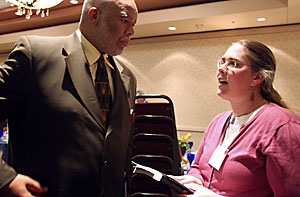 |
|
CASSIE TOMLIN/Arizona Daily Wildcat
|
Dr. Adewale Troutman talks with second-year medical student Autumn Stevenson after his talk on racial profiling during the College of Medicine's seventh annual Cultural Competency Conference yesterday at the Tucson Marriott University Park.
|
|
|
By Andrew O'Neill
Arizona Daily Wildcat
Thursday, March 31, 2005
Print this
Highlighting the significant racial issues involved in health care delivery in the United States, a nationally known physician tackled a number of controversial issues confronting the medical profession.
Dr. Adewale Troutman, director of the Louisville Metro Health Department, addressed a gathering of health care students and professionals at the Tucson Marriott University Park yesterday afternoon.
Troutman served as the keynote speaker at the seventh Annual Cultural Competency Conference, which is sponsored by the UA College of Medicine and organized by a group of medical students who belong to FACES, Fostering and Achieving Cultural Equity and Sensitivity.
The topic for this year's conference was "Racial Profiling in Medicine."
In his speech, Troutman said health equity is related to social justice, and people should have equal access to goods in society and should respect the civil rights of all.
"The real weapons of mass destruction are poverty, ignorance, racism and indifference," Troutman said.
He said that every man, woman and child in the United States should have comprehensive health insurance coverage and that skin color and the size of one's bank account should not determine a person's access to quality health care.
Chandan Kundavaram, a second-year medical student and one of the main organizers of the conference, was pleased with this year's speaker.
"We wanted a good speaker - someone who really knows what he's talking about," Kundavaram said, making reference to Troutman's diverse resume, which includes working with former U.S. Surgeon General David Satcher on a study of racial disparities in the delivery of health care.
Kundavaram said the goal of the conference was to make participants aware that a problem with racial profiling exists in the medical profession and of how they might be able to address it in their particular fields.
"I thought the topic was really interesting," said Marisa Menchola, a fourth-year clinical psychology graduate student.
Menchola said she was not familiar with the statistics Troutman mentioned in his speech concerning health disparities among different races.
"It's definitely an eye-opener," she said.
In addition to his position at the Metro Health Department in Louisville, Ky., Troutman also serves as associate professor in the College of Public Health and Information Sciences at the University of Louisville.
He holds advanced degrees in medicine, public health and black studies.
